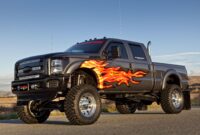Program Trucks For Sale: Your Comprehensive Guide to Smart Vehicle Acquisition sale.truckstrend.com
In the vast and often overwhelming landscape of vehicle acquisition, a unique category stands out for savvy buyers seeking value, reliability, and modern features without the steep price tag of a brand-new vehicle: Program Trucks. These aren’t just any used trucks; they represent a specific segment of pre-owned vehicles with distinct origins and often a meticulously documented history. Understanding what program trucks are, where they come from, and how to navigate their market can unlock significant savings and provide access to high-quality vehicles that might otherwise be out of reach.
This comprehensive guide will delve deep into the world of program trucks, exploring their definition, benefits, the purchasing process, essential considerations, and providing practical advice to help you make an informed decision. Whether you’re a small business owner looking for a reliable workhorse, an outdoor enthusiast needing a capable adventure vehicle, or simply someone seeking a dependable truck for daily life, program trucks offer a compelling alternative worth exploring.
Program Trucks For Sale: Your Comprehensive Guide to Smart Vehicle Acquisition
Understanding Program Trucks: What Exactly Are They?
At its core, a "program truck" refers to a vehicle that has been part of a structured fleet or corporate program and is now being sold to the public. Unlike typical used vehicles that might have had multiple private owners with varied maintenance habits, program trucks generally originate from a few well-defined sources, ensuring a certain level of accountability and often a more transparent history.
The most common origins for program trucks include:
- Rental Fleet Returns: Vehicles previously leased or owned by large rental companies like Enterprise, Hertz, Budget, or Avis. These trucks typically have higher mileage for their age but are rigorously maintained according to strict schedules to ensure customer safety and operational efficiency.
- Corporate Fleet Vehicles: Trucks used by businesses for their operations, such as utility companies, construction firms, delivery services, or sales teams. These vehicles are often driven by a single employee and maintained by the company’s fleet management, ensuring regular servicing.
- Manufacturer Demos/Loaners: Vehicles used by dealerships as test drive models, courtesy cars for service customers, or by manufacturer employees. These trucks usually have very low mileage, are well-kept, and are often the latest model year.
- Lease Returns: Trucks that have completed their lease terms from individuals or businesses. While the condition can vary, many are well-maintained due to lease agreements often requiring regular servicing.

What distinguishes these from a regular used truck is the institutional ownership and the structured maintenance programs they’ve undergone. This often translates into a more reliable purchase with a clearer lineage.
The Undeniable Benefits of Buying a Program Truck
Choosing a program truck offers a multitude of advantages that make them an attractive option for budget-conscious buyers who refuse to compromise on quality.
- Significant Cost Savings: The most compelling benefit is the depreciation factor. New vehicles lose a substantial portion of their value (20-30%) in their first year alone. Program trucks have already absorbed this initial depreciation hit, allowing you to acquire a relatively new vehicle at a fraction of its original MSRP.
- Newer Models with Lower Mileage (Often): While rental returns might have higher mileage, many program trucks, especially demos and corporate fleet vehicles, are only 1-3 years old with moderate to low mileage. This means you get access to modern safety features, technology, and improved fuel efficiency.
- Documented Maintenance History: One of the biggest unknowns with private used car sales is the maintenance history. Program trucks, particularly those from large fleets, come with comprehensive service records. This transparency provides peace of mind, knowing the vehicle has been regularly serviced and cared for according to manufacturer specifications.
- Potential for Remaining Warranty: Many program trucks are sold while still under their original factory bumper-to-bumper or powertrain warranties. This can save you from unexpected repair costs and provides a level of protection similar to buying a new vehicle. Even if the original warranty has expired, many dealerships offer extended warranty options.
- Generally Well-Maintained Condition: Given their professional ownership and maintenance schedules, program trucks are often in excellent mechanical condition. While some cosmetic wear and tear is expected, the underlying integrity of the vehicle is usually solid. Many are also professionally detailed before being put up for sale.
- Wide Selection and Variety: The program truck market offers a diverse inventory across various makes, models, configurations (e.g., crew cab, extended cab, short bed, long bed), and trim levels, increasing your chances of finding the exact truck that meets your needs and preferences.


Key Considerations Before You Buy: Navigating the Program Truck Market
While the benefits are clear, a smart purchase requires diligence. Here are crucial factors to consider before committing to a program truck:
- Verify the Source and History: Always request a vehicle history report (Carfax or AutoCheck). This report will detail the truck’s previous ownership (e.g., "fleet vehicle," "rental vehicle"), accident history, service records, and title status.
- Conduct a Thorough Pre-Purchase Inspection (PPI): This is non-negotiable. Hire an independent, certified mechanic to inspect the truck thoroughly. They can identify underlying mechanical issues, signs of excessive wear, or previous damage that might not be immediately apparent. A PPI is your best defense against unexpected post-purchase problems.
- Assess Wear and Tear: Pay close attention to the interior and exterior. Rental trucks, for instance, might show more signs of passenger wear (e.g., stained seats, scratches) compared to a corporate vehicle driven by one person. Evaluate if the cosmetic wear is acceptable or if it warrants negotiation on price.
- Confirm Warranty Status: If a remaining factory warranty is a key factor for you, ensure it’s still active and transferable. Understand what it covers and for how long. Inquire about extended warranty options offered by the dealership.
- Check for Recalls: Use the VIN to check the manufacturer’s website or NHTSA’s recall database to ensure all safety recalls have been addressed.
- Understand the Market Value: Research comparable program trucks and regular used trucks in your area. Tools like Kelley Blue Book (KBB) or Edmunds can help you determine a fair market price based on year, make, model, mileage, and condition.
The Buying Process: A Step-by-Step Guide to Acquiring Your Program Truck
Acquiring a program truck follows a similar path to buying any used vehicle, but with specific nuances.
- Define Your Needs and Budget: Before you start looking, know what you need in a truck (payload, towing capacity, seating, features) and how much you’re willing to spend. Remember to factor in insurance, registration, and potential immediate maintenance.
- Locate Sellers: Program trucks are primarily sold through:
- Franchise Dealerships: Often have certified pre-owned (CPO) programs that include former fleet vehicles, offering additional warranties and inspections.
- Independent Used Car Dealerships: May specialize in fleet vehicles or acquire them from auctions.
- Fleet Sales Divisions/Auctions: Larger companies sometimes sell directly, or vehicles go to wholesale auctions. While auctions can offer lower prices, they require more expertise and carry higher risks.
- Online Marketplaces: Websites like AutoTrader, CarGurus, Cars.com, and even manufacturer-specific certified pre-owned sites are great resources.
- Vet the Vehicle and Seller: Once you find a potential truck, review its online listing thoroughly. Look at photos, read the description, and check the seller’s reviews. Request the VIN for a history report.
- Test Drive and Initial Inspection: Schedule a test drive. During the drive, pay attention to engine noise, transmission shifts, braking, steering, and any unusual sounds or vibrations. Check all electronics, lights, and features. Visually inspect the exterior for dents, scratches, rust, and tire wear, and the interior for cleanliness and damage.
- Pre-Purchase Inspection (PPI): If the test drive goes well, proceed with a PPI by your trusted mechanic. This step is critical for uncovering hidden issues.
- Negotiation: Armed with your research (market value, PPI findings, history report), negotiate the price. Be prepared to walk away if the deal isn’t right.
- Financing and Paperwork: Secure your financing (dealership, bank, credit union). Read all sales contracts and warranty agreements carefully before signing. Ensure the title is clean and transferred correctly.
Understanding Program Truck Valuation: A Price Guide
The price of a program truck is influenced by numerous factors, similar to any used vehicle, but with specific considerations related to its fleet origin. The table below provides an estimated guide, emphasizing that actual prices vary widely.
| Factor/Category | Description | Typical Price Range (Estimated) | Notes & Impact on Price |
|---|---|---|---|
| Vehicle Type & Model | Light-duty (F-150, Silverado 1500), Heavy-duty (F-250, Ram 2500), Mid-size (Tacoma, Colorado), Commercial Vans, SUVs. | Highly Variable ($20,000 – $70,000+) | Pickups and commercial vehicles generally hold value well due to demand. Heavy-duty trucks are pricier. |
| Age (Model Year) | How old is the truck? (e.g., 1-2 years old, 3-4 years old, 5+ years old). | Newer = Higher, Older = Lower | Most program trucks are 1-4 years old, offering a sweet spot for depreciation savings. |
| Mileage | The total distance the truck has traveled. | Lower Mileage = Higher Price | A primary determinant of value. Rental fleet trucks typically have higher mileage for their age. |
| Condition (Overall) | Mechanical integrity, interior cleanliness, exterior appearance (dents, scratches, rust), tire wear. | Excellent = Higher, Fair = Lower | A pre-purchase inspection is crucial. Cosmetic flaws can be leverage for negotiation. |
| Trim Level & Features | Base model vs. fully loaded (e.g., XL vs. Lariat vs. King Ranch for Ford F-Series; standard vs. premium infotainment, towing package). | Higher for Premium Trims | Desirable features like 4×4, larger engines, advanced tech, and luxury interiors significantly increase value. |
| Brand/Manufacturer | Reputation for reliability, resale value, and demand (e.g., Ford, Chevrolet, Ram, Toyota, GMC). | Varies by Brand Reputation | Brands with strong resale values (e.g., Toyota Tacoma) often retain more of their program truck price. |
| Source/Previous Use | Manufacturer Demo/Loaner, Corporate Fleet, Rental Fleet, Lease Return. | Demos > Corporate > Lease Return > Rental | Demos are often pristine with very low miles. Rental trucks might show more interior wear and tear due to multiple users, but are usually well-maintained mechanically. |
| Geographic Location | Market demand and supply can vary by region. | Varies by Region | Trucks are more in demand (and thus pricier) in certain areas, especially where they are essential for work or recreation. |
| Remaining Warranty | Is there still active factory warranty coverage (bumper-to-bumper or powertrain)? | Significant Value Add | A truck with remaining warranty offers peace of mind and often commands a slightly higher price. |
| Typical Discount vs. New MSRP | The general savings achieved by buying a program truck compared to a brand-new identical model. | 20% – 40% Below New MSRP | This substantial saving is the primary draw of program trucks, making them an excellent value proposition. |
| Estimated Price Range for a 2-Year-Old Light-Duty Program Pickup (e.g., Ford F-150 XLT, Chevy Silverado 1500 LT, Ram 1500 Big Horn with 30,000-50,000 miles) | $28,000 – $45,000+ | Highly dependent on trim, engine, 4×4, and specific options. | |
| Estimated Price Range for a 3-Year-Old Heavy-Duty Program Pickup (e.g., Ford F-250 XLT, Chevy Silverado 2500HD LT, Ram 2500 Laramie with 40,000-70,000 miles) | $35,000 – $55,000+ | Varies significantly based on engine (gas/diesel), trim, and specific work packages. |
Note: The prices listed are estimates and can fluctuate based on current market conditions, specific vehicle configurations, and regional demand. Always conduct your own research for current market values.
Frequently Asked Questions (FAQ) About Program Trucks
Q1: Are program trucks reliable?
A1: Generally, yes. Program trucks, especially those from large fleets, undergo regular and documented maintenance. While rental trucks might experience more varied driving, their strict service schedules often mean they are mechanically sound. A pre-purchase inspection is always recommended to confirm reliability.
Q2: Do program trucks come with a warranty?
A2: Many program trucks, particularly those that are only 1-3 years old, may still be under the original factory warranty (bumper-to-bumper or powertrain). Dealerships also often offer extended warranties or certified pre-owned (CPO) programs that provide additional coverage. Always confirm the warranty status before purchasing.
Q3: What’s the main difference between a program truck and a regular used truck?
A3: The key difference lies in their origin and history. Program trucks come from structured environments (rental fleets, corporate fleets, manufacturer demos) with documented maintenance. Regular used trucks come from private owners, and their maintenance history can be less consistent or harder to verify. Program trucks often represent a higher degree of transparency and a more predictable maintenance record.
Q4: Where can I find program trucks for sale?
A4: Program trucks are commonly sold at franchise dealerships (often as Certified Pre-Owned), independent used car dealerships, and online marketplaces like AutoTrader, CarGurus, Cars.com, and even directly from some larger fleet companies.
Q5: Is it safe to buy a rental fleet truck?
A5: Yes, it can be perfectly safe. While rental trucks might endure more varied driving and potentially more cosmetic wear, they are typically maintained on a strict schedule by the rental company. The key is to get a thorough pre-purchase inspection and review the vehicle history report to ensure there are no red flags.
Q6: How much can I save by buying a program truck compared to a new one?
A6: You can expect significant savings, often 20% to 40% or more off the original Manufacturer’s Suggested Retail Price (MSRP) of a comparable new truck. This is because the steepest depreciation occurs in the first few years, which the program truck has already absorbed.
Q7: Should I always get a pre-purchase inspection (PPI)?
A7: Absolutely. A PPI by an independent, certified mechanic is crucial. It provides an unbiased assessment of the truck’s mechanical condition, identifies potential issues, and can save you from costly repairs down the line. It also gives you leverage for negotiation.
Q8: Can I finance a program truck?
A8: Yes, financing options are readily available for program trucks, similar to any other used vehicle. You can secure financing through the dealership, your bank, or a credit union. Interest rates will depend on your credit score and the age/mileage of the truck.
Conclusion: A Smart Choice for Savvy Buyers
Program trucks represent an often-overlooked segment of the automotive market, offering a compelling blend of value, reliability, and modern features. By understanding their origins, recognizing their inherent benefits, and approaching the purchase process with diligence and informed decision-making, buyers can secure a high-quality vehicle at a significantly reduced cost.
While due diligence—including thorough research, history checks, and a crucial pre-purchase inspection—is paramount, the potential for acquiring a well-maintained, relatively new truck with a clear history makes program trucks a highly attractive option. For those seeking to maximize their investment and drive home a capable vehicle without breaking the bank, exploring program trucks for sale is not just a smart choice, but often the best choice.




